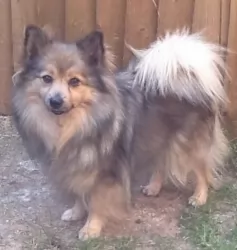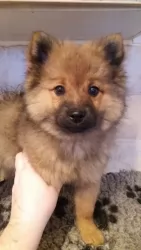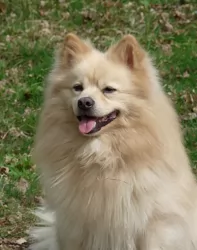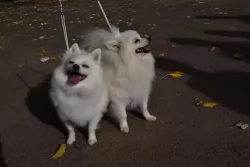 MyDogBreeds
MyDogBreeds German Spitz (Mittel) is originated from Germany but Dingo is originated from Australia. German Spitz (Mittel) may grow 22 cm / 8 inches shorter than Dingo. German Spitz (Mittel) may weigh 21 kg / 46 pounds lesser than Dingo. German Spitz (Mittel) may live 5 years less than Dingo. German Spitz (Mittel) may have less litter size than Dingo. Both German Spitz (Mittel) and Dingo requires Moderate maintenance.
German Spitz (Mittel) is originated from Germany but Dingo is originated from Australia. German Spitz (Mittel) may grow 22 cm / 8 inches shorter than Dingo. German Spitz (Mittel) may weigh 21 kg / 46 pounds lesser than Dingo. German Spitz (Mittel) may live 5 years less than Dingo. German Spitz (Mittel) may have less litter size than Dingo. Both German Spitz (Mittel) and Dingo requires Moderate maintenance.
 Originating in Germany, the German Spitz Mittel is an alert, vigilant dog and it is these qualities that made him sought after for working on farms.
Originating in Germany, the German Spitz Mittel is an alert, vigilant dog and it is these qualities that made him sought after for working on farms.
He is no new breed and is the 3rd largest of the five German Spitz varieties. It is believed that the German Spitz descended from the Northern sled and herding dogs which arrived with the Vikings into Europe. When you do research you see that the dogs are mentioned in German literature which dates way back to to 1450 already.
 The Dingo dog was in all probability, introduced to Australia thousands of years ago. He isn’t your usual domesticated dog and in fact it is a feral dog native to Australia.There are stories that suggest that while they may have once been pets, they were abandoned so that they reverted back to their wild state.
The Dingo dog was in all probability, introduced to Australia thousands of years ago. He isn’t your usual domesticated dog and in fact it is a feral dog native to Australia.There are stories that suggest that while they may have once been pets, they were abandoned so that they reverted back to their wild state.
They became pests for Australian farmers, going for their livestock, and huge fences were erected. The different climates in Australia have meant different kinds of Dingo developing, so while the desert ones are like the desert sands - golden yellow to red the alpine ones are rarer and are cream colored.
These wild canines were also introduced to Southeast Asia some 3,500 years ago, however the dog’s exact origin is debatable. There are any number of groups of people who could have brought the dingo to Australia, and among some of these are Indian mariners or maritime hunters.
The dog has been found in many parts of mainland Australia but never became established in Tasmania.There has also been an effort to remove the Dingo from farming areas. It is interesting to note that the first Dingo, referred to as the Australian dog, was registered at the London Zoo in 1828.
 The German Spitz Mittel is similar in looks to the other sizes of German Spitz. The Mittel is a medium sized dog and stands between 30 and 38cm in height and weighs between 7 and 11kg. You’ll find him in solid colors such as tan, liver, white, fawn, black or a mix of these colors.
The German Spitz Mittel is similar in looks to the other sizes of German Spitz. The Mittel is a medium sized dog and stands between 30 and 38cm in height and weighs between 7 and 11kg. You’ll find him in solid colors such as tan, liver, white, fawn, black or a mix of these colors.
He has a soft woolly undercoat and a long outercoat with a mane-like ruff at the neck. He has a fairly long muzzle, dark eyes, sharp erect ears and a bushy tail which curls over his back.
Affectionate, faithful, and always happy by nature, the German Spitz Mittel is a family companion that wants to be part of everything his human family is up to. He makes a good watchdog. He is alert and has a distrust of strangers.
He gets on well with children in the home and he can also live in peace with other dogs. Because he is an intelligent dog, you won’t have much trouble with training- and socializing him, although he will require a firm, consistent owner and trainer.
Training and socialization are important as there are always some important commands such as sit, stay, come and lie down that you will want him to respond to immediately.
 An interesting fact with these fascinating feral dogs, is that like humans, they’ve got rotating wrists. This characteristic of theirs allows them to use their paws much like the human hand to catch their prey. A domesticated Dingo can therefore learn how to open doors.
An interesting fact with these fascinating feral dogs, is that like humans, they’ve got rotating wrists. This characteristic of theirs allows them to use their paws much like the human hand to catch their prey. A domesticated Dingo can therefore learn how to open doors.
The Dingo is a medium sized dog standing at roughly 52 – 60cm in height, measuring up to 1.2 meters in length and weighing roughly between 23 to 32kg.
He has long canine teeth, a long muzzle, upright ears and a long, thick tail. The coat is essentially one color, sandy, white, cream, tan or black and sometimes there are white markings on the chest, the paws and around the muzzle.
The fur is typically shortish and thick — though the hair's thickness and length will depend on the climate of the area. The Dingo is a moderate shedder and a good brushing of the coat twice a week will keep the thick coat shiny and healthy.
These wild canines are social animals, and in the wild they live in packs. There are some that opt to live on their own.
They’e territorial, but they are able to share their living space with humans. They’re generally shy around humans, but a Dingo that is trained and socialized can get along well with children and pets in the home.
 People who have owned a German Spitz Mittel are delighted with him, saying that he is such an easy-going, happy dog. He is social and thrives on the interaction he has with his human family.
People who have owned a German Spitz Mittel are delighted with him, saying that he is such an easy-going, happy dog. He is social and thrives on the interaction he has with his human family.
He won’t do well if you simply put him in your backyard and forget about him, using him merely as a watchdog.
The German Spitz Mittel dog is one dog that definitely lives up to the title of man’s best friend. He is social, happy, loving, loyal, playful, entertaining and smart too, and when you treat him the way he deserves, you’ve got the most awesome friend.
 Dingoes have been domesticated successfully. Some people swear by them as making a fantastic pet. However, they’re wild dogs and can be unpredictable.
Dingoes have been domesticated successfully. Some people swear by them as making a fantastic pet. However, they’re wild dogs and can be unpredictable.
There are others who have tried to keep the Dingo as a pet but who have discarded them when they proved to be a danger in the home.
Dingoes can be trained but they’re high energy dogs and require a lot of exercise. How do you feel about owning a Dingo as a pet? Many people feel that its not fair to bring an essentially wild animal into your home. They feel that there are plenty of rescue dogs dying for a home without human beings searching in the wilds for an unusual pet, and regretting it later on.
 German Spitz dogs are healthy, and when you shower him with love and attention and good food, you can expect to have him around for up to 15 years of age.
German Spitz dogs are healthy, and when you shower him with love and attention and good food, you can expect to have him around for up to 15 years of age.
Of course, as with any other healthy dog breeds, there are always one or two common dog illnesses that your dog may get. These include hip dysplasia and eye diseases. If you notice symptoms that indicate possible joint issues with your pet, get him to the vet immediately.
Patellar Luxation for instance occurs when your dog’s kneecap is dislocated. It is more common in toy breeds like the German Spitz. It can be painful for your pet and lead to lameness. If your dog has problems with his hip, it can actually force the patella out of its groove, which is a secondary condition.
 The Dingo is a long-lived dog and you can expect your Dingo to live till anything between 15 and 20 years.
The Dingo is a long-lived dog and you can expect your Dingo to live till anything between 15 and 20 years.
When it comes to health issues, they are robust and resilient, having less medical problems to contend with than your regular dog.
However if you see that your Dingo is not his usual robust, energetic self, get him to the vet as soon as you can.
 You can help reduce loose hairs with your German Spitz by brushing his thick coat twice a week. It’s a good time to also inspect your dog for ticks and fleas.
You can help reduce loose hairs with your German Spitz by brushing his thick coat twice a week. It’s a good time to also inspect your dog for ticks and fleas.
Your German Spitz Mittel isn’t the most active dog, but he will still need regular exercise. Going on a walk is good for both you and him. He is a mentally sharp dog too and these walks keep him both physically- and mentally fit. He also loves ball games.
Every dog deserves the best food, and if you feed your German Spitz Mittel with a commercially manufactured dog food, make sure its one of the top quality ones. You want to avoid foods packed with preservatives, colorants and fillers. You want dog foods with minerals and vitamins with high protein and ingredients such as Omega 3 and 6 to promote health skin.
There are also some dog foods which have ingredients in them such as polyphosphates. Ingredients like this keep your dog’s teeth clean.
Try and also give him some cooked rice, vegetables and chicken mixed into his kibble from time to time as well as raw meat. He should never be without fresh, cool water.
 Caring for your Dingo will be different to caring for your usual pet dog. You have to remember the Dingo is an ancient, wild species with some unique characteristics. Having a Dingo as a pet and companion may not be an easy task, and it is why many people selfishly dump their Dingoes – they didn’t quite live up to what they had in mind.
Caring for your Dingo will be different to caring for your usual pet dog. You have to remember the Dingo is an ancient, wild species with some unique characteristics. Having a Dingo as a pet and companion may not be an easy task, and it is why many people selfishly dump their Dingoes – they didn’t quite live up to what they had in mind.
Your Dingo, just like any other dog you’d have, will require training and socialization, and the earlier the better. No training will simply mean you having an unruly pet in the home.
Your Dingo can be fed just like you would with your other dogs. You can feed him quality dog kibble as his main diet, but you can also add in cooked rice, vegetables and chicken. Your Dingo is essentially a wild dog, so you will definitely want to include some raw meat into his diet from time to time as well.
A Dingo is used to running free so he will require plenty of outdoor exercise. He can also be put on a leash and taken for a walk. He’ll love joining you in your activities such as running alongside you as you jog or cycle. He can adapt to life in the city if he is well exercised but he isn’t suited to a small home or garden.